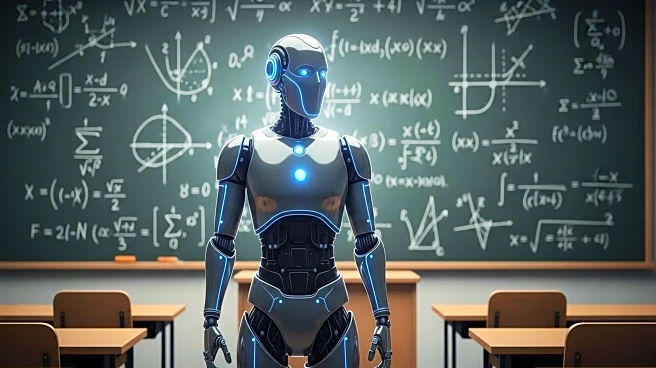What is the story about?
What's Happening?
A recent analysis by a Massachusetts Institute of Technology (MIT) researcher examines the historical failures of educational technology and their implications for the integration of artificial intelligence (AI) in schools. The study highlights that past technological innovations, such as film strips and mobile phones, did not yield the expected educational benefits when rapidly adopted. The researcher emphasizes that new technologies, including AI, require careful implementation and community guidance to be effective. The article suggests that educators should adopt a cautious approach, focusing on rigorous testing and evidence-based practices to ensure AI's successful integration into educational settings.
Why It's Important?
The integration of AI in education holds significant potential to transform learning environments, but it also presents challenges. The historical context provided by the MIT researcher underscores the importance of not repeating past mistakes of overconfidence and hasty adoption. The potential impact of AI on education is vast, affecting students, teachers, and educational institutions. Successful integration could enhance learning experiences and outcomes, while failure to implement AI thoughtfully could lead to ineffective educational practices and wasted resources. The analysis calls for a balanced approach, emphasizing humility, experimentation, and assessment to navigate the uncertainties of AI in education.
What's Next?
As AI continues to permeate educational settings, schools and educators are encouraged to act as scientists, experimenting with AI applications while awaiting more comprehensive research findings. The MIT researcher suggests that educators should conduct local assessments to evaluate the impact of AI on student outcomes. This approach allows for iterative improvements and informed decision-making. The broader educational community is expected to learn from these experiments, contributing to a more nuanced understanding of AI's role in education by 2035. The ongoing dialogue and research will likely shape future policies and practices regarding AI in schools.
Beyond the Headlines
The ethical and cultural implications of AI in education are significant. The potential for AI to reshape educational norms and practices raises questions about equity, access, and the role of technology in learning. The analysis highlights the need for educators to remain adaptable and open to revising their approaches as new evidence emerges. The long-term impact of AI on education will depend on the ability of educators and policymakers to balance innovation with caution, ensuring that AI serves as a tool for enhancing, rather than hindering, educational outcomes.

















